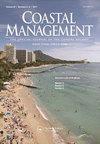印尼海洋空间规划实施进展与制约因素
IF 1.9
4区 环境科学与生态学
Q4 ENVIRONMENTAL SCIENCES
引用次数: 0
摘要
摘要海洋空间规划(MSP)是一种现代科学方法,旨在平衡人类在空间和时间上的活动,通过公共程序实现社会经济和环境目标。许多发展中国家,如印度尼西亚,一直在采用和应用MSP方法,以支持海洋和沿海地区的可持续利用,并减少对海洋资源和区域的多种利用的冲突。MSP还旨在减少环境影响,如污染、过度捕捞和非法捕鱼、基于流域的污染和沿海发展影响。虽然从规划到实施的过渡过程是一项艰巨的任务,但本文旨在解释和学习印尼MSP的发展过程,并提出一个政策路线图,作为印尼国家和省政府的行动计划。本文的投入来源于一次全国合作研讨会,该研讨会有80名参与者,来自美国、加拿大和澳大利亚的国际专家,以及印尼政府、非政府部门和大学代表。出现的主题是:克服执行挑战、让土著群体参与、分区考虑、与利益攸关方沟通、许可证和许可证、合作执行、监测和评估以及陆海跨部门机制。对这些主题进行了分析和讨论,将其作为在印度尼西亚MSP业务基础上采取战略方法的关键工具。阻碍MSP实施的因素包括数据差距、利益相关者之间的利益冲突以及合法化过程的复杂性。与会者一致认为,坚定的领导、利益相关者的参与和支持对于支持印度尼西亚MSP的有效实施和真正适应性的管理方法至关重要。本文章由计算机程序翻译,如有差异,请以英文原文为准。
Towards Marine Spatial Planning Implementation in Indonesia: Progress and Hindering Factors
Abstract Marine Spatial Planning (MSP) is a modern scientific approach to balancing human activities both in space and time for achieving socio-economic and environmental targets through a public process. The adoption and application of the MSP approach have been proceeding in many developing countries like Indonesia to support the sustainable use of marine and coastal areas and to reduce conflicts for multiple uses of marine resources and areas. MSP also aims to reduce environmental impacts such as pollution, overfishing and illegal fishing, watershed-based pollution and coastal development impacts. Whilst the transition process from planning to implementation is an onerous mission, this paper aims to explain and learn from the process of Indonesian MSP development and propose a policy roadmap as an action plan for the national and provincial governments of Indonesia. Input for this paper was derived from a collaborative national symposium that involved 80 participants with international experts from U.S., Canada, and Australia, together with the Indonesian government, non-government sectors, and university representatives. The themes that emerged were: overcoming implementation challenges, engaging indigenous groups, zoning considerations, communicating with stakeholders, licensing and permits, collaborative enforcement, monitoring and evaluation, and land-sea cross-sectoral mechanisms. These themes were analyzed and discussed as the key instruments for a strategic approach in the operational base of MSP for Indonesia. Hindering factors to MSP implementation included data gaps, conflict of interest among stakeholders, and the complexity of the legalization process. It was agreed that committed leadership, stakeholder involvement and buy-in are essential to support effective implementation and a truly adaptive management approach for MSP in Indonesia.
求助全文
通过发布文献求助,成功后即可免费获取论文全文。
去求助
来源期刊

Coastal Management
环境科学-环境科学
CiteScore
6.00
自引率
0.00%
发文量
24
审稿时长
>36 weeks
期刊介绍:
Coastal Management is an international peer-reviewed, applied research journal dedicated to exploring the technical, applied ecological, legal, political, social, and policy issues relating to the use of coastal and ocean resources and environments on a global scale. The journal presents timely information on management tools and techniques as well as recent findings from research and analysis that bear directly on management and policy. Findings must be grounded in the current peer reviewed literature and relevant studies. Articles must contain a clear and relevant management component. Preference is given to studies of interest to an international readership, but case studies are accepted if conclusions are derived from acceptable evaluative methods, reference to comparable cases, and related to peer reviewed studies.
 求助内容:
求助内容: 应助结果提醒方式:
应助结果提醒方式:


